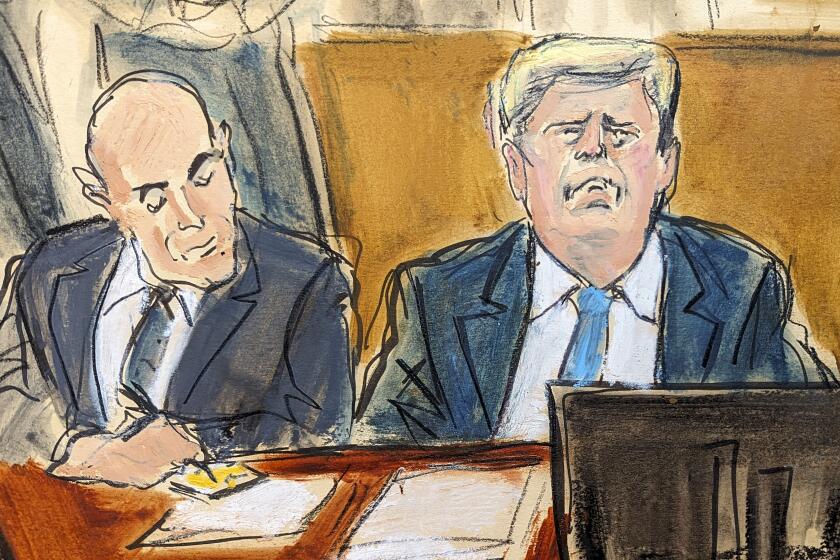This Is No Time to Push Nuclear Secrecy
Before the accident at Chernobyl, “average Americans” had only limited or sporadic interest in the U.S. Nuclear Regulatory Commission’s work. Now, just as the question of nuclear-plant safety is of widespread concern, the commission is pressing ahead with changes in the way it does business that will curb public access to its deliberations.
When Congress created the commission, it determined that the complex, difficult and often controversial issues of nuclear regulation could be handled best by a collegial decision-making process. This requires that the five NRC commissioners forge a consensus to decide such matters as the establishment and enforcement of safety requirements for nuclear-power plants, the medical and industrial uses of nuclear materials and the disposal of radioactive waste. In order to build that consensus, the commissioners meet frequently to develop and exchange ideas, to debate the issues and to narrow and refine options.
A federal “sunshine act” passed by Congress in 1976 requires commissions and agencies such as the NRC to open their meetings to public observation whenever the members are conducting official business. Yet the law also recognizes that agencies may need to meet in private where there is a legitimate need for confidentiality. Therefore, the act contains 10 exemptions to public access when agencies must discuss such subjects as national defense and foreign policy, civil and criminal enforcement investigations, personnel matters and trade secrets.
From 1976 to 1985 the NRC’s rules implementing the act effectively limited commission discussions of official agency business to public meetings unless the matters were subject to exemption. The law’s exemptions had given the agency sufficient flexibility to close about one-third of its meetings.
But last year the NRC revised its rules to provide expressly for a new category of secret meetings, or “gatherings,” which go beyond exemptions specified in the sunshine law: Gatherings would be permitted to discuss official agency business so long as the discussions were not “sufficiently focused on discrete proposals or issues as to cause, or be likely to cause, the individual participating members to form reasonably firm positions regarding matters pending or likely to arise before the agency.” In other words, gatherings that involved discussions preliminary to decision-making could be closed to the public.
In a remarkable demonstration of insensitivity, the NRC chose to put its new rule into effect immediately, before obtaining the comments of those who would be affected. Predictably, public comments received by the agency have overwhelmingly opposed the new rule. Despite this opposition, a majority of the commission seems intent on making the change final. That has been delayed only in the hope that the American Bar Assn., which is reviewing the change, will provide some support and legitimacy for the commissioners’ efforts.
The supporters of the new rule argue that this authority to hold gatherings is needed to improve the agency’s efficiency and to enhance collegiality. Put simply, the argument is that individual commissioners are more comfortable expressing their views and exchanging ideas if they can do so in private. However understandable the preference for privacy may be, it is fundamentally at odds with the purpose of the sunshine law, which is to ensure public accountability of senior government officials when doing the public’s business.
The NRC’s new rule suffers from a number of other defects as well. The standard for determining whether the commission may hold a gathering--whether the discussions are sufficiently preliminary to a decision--is vague and subjective. The rule contains no guidelines or explanations as to how this standard is to be interpreted and applied, and the commission has been unable or unwilling to state what it intends to do in these gatherings. Without such clarification there is a clear potential for inadvertent or intentional abuse. And there is no effective remedy if this new standard is abused.
Normally, even when government commissions conduct meetings in private they keep minutes or transcripts of what transpires. The NRC will not, nor will it give public notice of such meetings or their topics. In the absence of notice and some record of what has been discussed, as a practical matter it will be impossible to correct the harm done to the public if the commission stretches the new standard beyond permissible limits.
Ever since the Three Mile Island accident in 1979, the NRC has faced the challenge of restoring the public’s confidence in its regulatory ability. An essential ingredient of public confidence is the public’s ability to hear the views of commissioners and to observe the exchange of ideas leading to agency decisions. This is vitally important in matters involving nuclear energy.
The danger of keeping the public in the dark is one lesson from Chernobyl that the “average American” readily understands. If the NRC persists with its exclusionary rule, public confidence in nuclear safety may have to be rebuilt from Square One.
More to Read
Start your day right
Sign up for Essential California for news, features and recommendations from the L.A. Times and beyond in your inbox six days a week.
You may occasionally receive promotional content from the Los Angeles Times.






